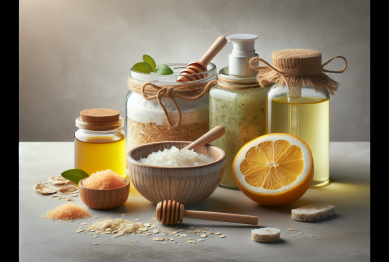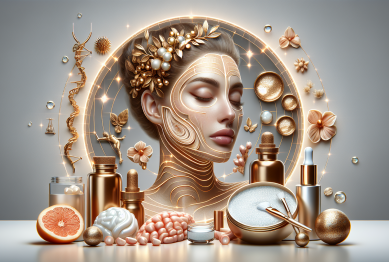Discover how integrating smart collagen habits into your daily routine could support lasting skin wellness and natural beauty. This guide explores the science, routines, and food strategies behind glowing skin, making sense of real approaches to long-term skin health.
Understanding Collagen’s Role in Skin Wellness
Collagen is a vital protein naturally produced by the body. It is essential for strong, healthy skin, supporting firmness and elasticity throughout every life stage. Collagen types I and III are especially abundant in the skin, making up nearly 80% of its dry weight. Over time, with natural aging and environmental stress, collagen production gradually slows, which means that wrinkles or sagging can appear more visible. Leading dermatology sources highlight that starting as early as your 20s, collagen levels start to decline by about 1% each year—making proactive wellness habits extremely important for lifelong beauty (Source: https://www.ncbi.nlm.nih.gov/pmc/articles/PMC3583892/).
Collagen’s function extends beyond appearance. It acts as the skin’s building block, holding moisture in the dermis and supporting quick repair. When collagen breaks down faster than it’s replenished, skin may become thinner or drier. UV exposure, poor sleep habits, and high sugar diets contribute to collagen breakdown over time. Understanding these mechanisms may help people select habits and skin care routines that support the body’s natural collagen synthesis, offering a practical approach to radiant, resilient skin for years to come.
Modern research continues to reveal the numerous roles that collagen plays in wellness, including forming structures of bone, muscle, and connective tissue. In skincare, it’s become a focus of both clinical studies and popular regimens because of its strengths in hydration and structural integrity. Many people seek out topical or oral products featuring collagen-boosting ingredients, but the foundation always starts with knowledge and supportive day-to-day care that protects the body’s ability to create collagen naturally (Source: https://www.aad.org/public/everyday-care/skin-care-basics/correct/collagen).
Daily Habits to Support Collagen and Skin Beauty
Daily routines can influence collagen health more than many realize. Regular hydration, consistent use of sunscreen, and nutrient-dense meals provide necessary tools for your body to keep skin looking vibrant. Sunscreen, particularly broad-spectrum SPF 30 or higher, is commonly recommended to prevent collagen loss from UV exposure. Sleep and movement are equally critical, as repair and collagen synthesis increase overnight. Establishing steady bedtime routines and gentle exercise can both contribute to better skin texture and tone.
Gentle skincare regimens featuring mild cleansers, antioxidants, and consistent moisturization are central to protecting the skin’s collagen matrix. Over-exfoliation or harsh treatments may strip natural oils, undermining the protective layers that keep skin supple. Additionally, limiting excessive sugar helps minimize glycation, a chemical process that can weaken collagen fibers. This detail is often overlooked, but research shows that minimizing sugar and processed foods is beneficial for skin youthfulness (Source: https://www.ncbi.nlm.nih.gov/pmc/articles/PMC3299225/).
Incorporating stress-management techniques—like deep breathing, yoga, or mindful practices—can also pay dividends for skin resilience. Chronic stress elevates hormone levels that may break down collagen, so investing in stress reduction can provide visible beauty returns over time. Whether it’s a few moments of meditation or journaling, these habits may help maintain the balance of hormones needed for optimal skin repair, giving natural beauty a better foundation for the long run (Source: https://www.health.harvard.edu/staying-healthy/why-stress-causes-people-to-overeat).
Collagen-Boosting Foods and Nutrients
Nourishment that targets collagen comes from a well-rounded, colorful diet. Vitamin C-rich produce like oranges, strawberries, and dark leafy greens is critical for pro-collagen formation, which is the precursor to mature collagen in the body. Amino acids such as glycine and proline, found in lean meats, chicken skin, bone broth, and fish, serve as raw materials for the body’s natural collagen production. Plant-based eaters can turn to spirulina, soy, and various legumes for both amino acids and antioxidants.
Zinc and copper, present in nuts, seeds, and whole grains, are vital minerals that support collagen cross-linking and stability. Without these trace minerals, skin may struggle to maintain firmness and handle repair after sun or wind exposure. Nutritionists encourage a diet with a broad spectrum of colors, focusing on unprocessed sources, to ensure that every layer of skin receives what it needs for ongoing renewal. These nutrients don’t just help with beauty but also support wound healing and protection against oxidative damage (Source: https://ods.od.nih.gov/factsheets/VitaminC-Consumer/).
Supplementation with hydrolyzed collagen peptides has become popular in recent years. Several clinical studies indicate that including 2.5 to 10 grams per day may boost skin hydration and elasticity in some adults. However, nutrition experts widely agree that a diet rich in antioxidants, vitamins, and protein—combined with wise supplementation if needed—offers a more sustainable approach than relying solely on any pill or powder. Smart choices in daily nutrition habits lay the groundwork for glowing, resilient skin (Source: https://journals.sagepub.com/doi/full/10.1177/20503121211060853).
Routines for Maximizing Collagen Retention
Building sustainable beauty routines is about making small, positive choices that add up over weeks and months. Morning and evening skincare rituals that focus on gentle cleansing, hydration, and protection are essential for limiting collagen loss. Applying antioxidant serums, like those with vitamin C or E, before moisturizer or sunscreen can create an extra barrier against daily pollutants and free radicals. Evening rituals should prioritize thorough cleansing, nourishment, and soothing treatments to help skin recover from environmental stressors encountered during the day.
Professional skin treatments—such as micro-needling, low-level lasers, or peels—have been studied for their effects on increasing collagen density in the dermal layers. While results can be significant, it’s crucial to seek these only from licensed professionals and to approach any treatment plan with patience and realistic expectations. Combining professional therapies with at-home habits, such as regular facial massages or cooling jade rollers, may encourage even circulation and improved tone. Always personalize routines for individual needs and preferences, rather than imitate one-size-fits-all trends.
Consistency is often the deciding factor in visible outcomes. Many people underestimate the value of simple daily protection, like wearing hats or using mineral sunscreen outdoors. Layering lightweight, breathable clothing or UV-protective fabrics can offer year-round support, even in cloudy weather. Those who prioritize these foundational steps alongside nourishing skincare products often find their skin’s appearance and comfort improve steadily, demonstrating the compounding benefits of collagen-friendly routines.
Lifestyle Factors Affecting Collagen Health
Lifestyle choices have a powerful impact on how skin ages and how well it retains its youthful qualities. Smoking, frequent alcohol consumption, and poor sleep are well-documented factors that accelerate collagen loss and depletion. Smokers, for example, often show increased fine lines and dullness due to the combined effect of toxins and vascular constriction in facial blood vessels. Alcohol can leave skin dehydrated and less able to repair, so moderation makes a noticeable difference.
Regular movement, such as brisk walking, swimming, or yoga, boosts circulation and builds resilience throughout the skin’s support network. Exercise brings more oxygen and nutrients to the skin, helping the body produce new collagen and clear away damaging metabolites. Getting outside, even briefly, has also been associated with better sleep and stress control, both of which indirectly benefit skin structure and appearance (Source: https://www.cdc.gov/physicalactivity/basics/pa-health/index.htm).
Positive social habits, such as sharing laughter, having meaningful conversations, or volunteering, foster connection and lower stress hormones. Lower stress contributes to less inflammatory damage and supports a hormonal environment favorable for collagen retention. Those who invest in their emotional and physical environment often find benefits that go far beyond the mirror—healthy collagen, brighter outlook, and vibrant skin that reflects a balanced approach to beauty.
Debunking Myths and Setting Realistic Goals
With the popularity of collagen supplements and anti-aging treatments, claims can sometimes outpace what research supports. It’s important to recognize that dramatic overnight changes in skin firmness or lines are not realistic. Most scientific reviews point to gradual improvements over months with consistent care, good nutrition, and sun safety. Seeking out reputable sources and paying attention to ingredients can help you avoid ineffective—or even harmful—trends.
Misconceptions about collagen’s role in wellness occasionally mislead consumers. For example, ingesting collagen does not guarantee that the exact molecules reach the skin unchanged; the body breaks them down and uses the amino acids as needed. Habits that promote the body’s own production—like vitamin C intake, anti-oxidant rich vegetables, and sun protection—are grounded in evidence and yield longer-lasting results than topical fads alone (Source: https://ods.od.nih.gov/factsheets/Collagen-Consumer/).
Setting realistic beauty goals means focusing on steady progress and celebrating small wins. Regularly monitoring changes in hydration, texture, and glow provides helpful feedback on what’s working. Dermatologists suggest tracking visible changes with photos under similar lighting and being open to adjusting routines as skin needs shift with the seasons or age. Embracing patience and consistency can replace the stress of constant comparison, leading to greater satisfaction—and better results—over time.
References
1. Baumann, L. (2019). Skin ageing and collagen. Retrieved from https://www.ncbi.nlm.nih.gov/pmc/articles/PMC3583892/
2. American Academy of Dermatology Association. (2022). Collagen and skin: What you need to know. Retrieved from https://www.aad.org/public/everyday-care/skin-care-basics/correct/collagen
3. Levine, M., Rumsey, S. C., & Daruwala, R. (2021). Vitamin C in human health and disease is still a mystery? An overview. Retrieved from https://ods.od.nih.gov/factsheets/VitaminC-Consumer/
4. Caton, J. (2021). Effectiveness of collagen supplementation in the skin. Retrieved from https://journals.sagepub.com/doi/full/10.1177/20503121211060853
5. Centers for Disease Control and Prevention. (2023). Benefits of physical activity. Retrieved from https://www.cdc.gov/physicalactivity/basics/pa-health/index.htm
6. National Institutes of Health. (2022). Collagen—Consumer fact sheet. Retrieved from https://ods.od.nih.gov/factsheets/Collagen-Consumer/









